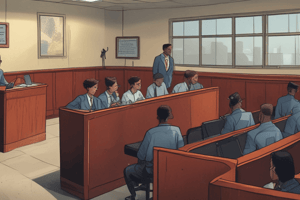Podcast
Questions and Answers
Which group is considered 'unreasonable' in terms of anonymity when it comes to juvenile defendants?
Which group is considered 'unreasonable' in terms of anonymity when it comes to juvenile defendants?
The welfare of the child is always the most important factor in court proceedings regarding juvenile offenders.
The welfare of the child is always the most important factor in court proceedings regarding juvenile offenders.
False (B)
What legitimate public interest exists regarding juvenile defendants who are convicted of serious crimes?
What legitimate public interest exists regarding juvenile defendants who are convicted of serious crimes?
Knowing the outcome of court proceedings and potential deterrent effects
Communities have the right to know about juvenile offenders, particularly in cases of __________ crimes.
Communities have the right to know about juvenile offenders, particularly in cases of __________ crimes.
Signup and view all the answers
Match the following terms with their definitions:
Match the following terms with their definitions:
Signup and view all the answers
What section of the Children and Young Persons Act 1933 provides automatic anonymity for young people under 18 in youth court?
What section of the Children and Young Persons Act 1933 provides automatic anonymity for young people under 18 in youth court?
Signup and view all the answers
The public is allowed to attend youth court sessions and report on proceedings freely.
The public is allowed to attend youth court sessions and report on proceedings freely.
Signup and view all the answers
What must journalists do to gain access to youth court?
What must journalists do to gain access to youth court?
Signup and view all the answers
Young individuals accused of serious crimes may be transferred to an adult court known as the __________ court.
Young individuals accused of serious crimes may be transferred to an adult court known as the __________ court.
Signup and view all the answers
Which of the following reasons could lead a court to consider lifting Section 49 anonymity for a young defendant?
Which of the following reasons could lead a court to consider lifting Section 49 anonymity for a young defendant?
Signup and view all the answers
Match the following court procedures with the appropriate acts:
Match the following court procedures with the appropriate acts:
Signup and view all the answers
A Section 45 order can be imposed in adult courts to provide young people with __________.
A Section 45 order can be imposed in adult courts to provide young people with __________.
Signup and view all the answers
What type of order can be challenged for an adult?
What type of order can be challenged for an adult?
Signup and view all the answers
A juvenile under 18 can be named before they appear in court without any legal consequences.
A juvenile under 18 can be named before they appear in court without any legal consequences.
Signup and view all the answers
Under the age of what age is a child considered too young to be affected by media reports?
Under the age of what age is a child considered too young to be affected by media reports?
Signup and view all the answers
IPSO clause 6 requires consent from a ______ to interview or photograph children under 16 regarding welfare issues.
IPSO clause 6 requires consent from a ______ to interview or photograph children under 16 regarding welfare issues.
Signup and view all the answers
Match the following age groups with their classifications:
Match the following age groups with their classifications:
Signup and view all the answers
What does Clause 9 of IPSO emphasize regarding children under 18?
What does Clause 9 of IPSO emphasize regarding children under 18?
Signup and view all the answers
Before identifying juveniles as defendants, broadcasters must provide ______ justification.
Before identifying juveniles as defendants, broadcasters must provide ______ justification.
Signup and view all the answers
Young offenders are treated similarly to adults within the legal system.
Young offenders are treated similarly to adults within the legal system.
Signup and view all the answers
What statute grants the civil and coroners courts the power to anonymise individuals under 18?
What statute grants the civil and coroners courts the power to anonymise individuals under 18?
Signup and view all the answers
Which of the following is NOT a publication restriction for juveniles in youth court hearings?
Which of the following is NOT a publication restriction for juveniles in youth court hearings?
Signup and view all the answers
Juveniles can be named in youth court cases once they turn 18, unless other restrictions are in place.
Juveniles can be named in youth court cases once they turn 18, unless other restrictions are in place.
Signup and view all the answers
Under what act must reports of youth court hearings not name juveniles?
Under what act must reports of youth court hearings not name juveniles?
Signup and view all the answers
A juvenile can be identified in youth court if their offending was __________.
A juvenile can be identified in youth court if their offending was __________.
Signup and view all the answers
Match the following scenarios to the correct reasoning for identifying a juvenile:
Match the following scenarios to the correct reasoning for identifying a juvenile:
Signup and view all the answers
When can anonymity be lifted according to the guidelines in the public interest?
When can anonymity be lifted according to the guidelines in the public interest?
Signup and view all the answers
An adult involved in a youth court case cannot be identified if it risks revealing the identity of a juvenile.
An adult involved in a youth court case cannot be identified if it risks revealing the identity of a juvenile.
Signup and view all the answers
What is one reason that could justify the identification of a juvenile in the public interest?
What is one reason that could justify the identification of a juvenile in the public interest?
Signup and view all the answers
The act that governs the identification of juveniles for Anti-social Behaviour is the __________ Act 2015.
The act that governs the identification of juveniles for Anti-social Behaviour is the __________ Act 2015.
Signup and view all the answers
Which of the following is a reason against lifting the anonymity of a juvenile?
Which of the following is a reason against lifting the anonymity of a juvenile?
Signup and view all the answers
What must a section 45 order in adult criminal courts NOT include?
What must a section 45 order in adult criminal courts NOT include?
Signup and view all the answers
Judges in civil courts can impose a section 39 order only on juveniles involved in the case.
Judges in civil courts can impose a section 39 order only on juveniles involved in the case.
Signup and view all the answers
Which act allows judges in adult criminal courts to ban the identification of juveniles?
Which act allows judges in adult criminal courts to ban the identification of juveniles?
Signup and view all the answers
A section 39 order under the __________ and Young Persons Act 1933 allows for the identification ban in civil courts.
A section 39 order under the __________ and Young Persons Act 1933 allows for the identification ban in civil courts.
Signup and view all the answers
What must courts consider before making a decision on a juvenile's identification ban?
What must courts consider before making a decision on a juvenile's identification ban?
Signup and view all the answers
Once a section 45 order is imposed, it cannot be lifted during the proceedings.
Once a section 45 order is imposed, it cannot be lifted during the proceedings.
Signup and view all the answers
What is the primary purpose of considering the welfare of a juvenile in court decisions?
What is the primary purpose of considering the welfare of a juvenile in court decisions?
Signup and view all the answers
Which of the following factors can lead to lifting a section 45 order?
Which of the following factors can lead to lifting a section 45 order?
Signup and view all the answers
Judges must have a good reason for imposing a section 45 order, excluding the juvenile's __________.
Judges must have a good reason for imposing a section 45 order, excluding the juvenile's __________.
Signup and view all the answers
Flashcards
Youth Court
Youth Court
A court specifically designed for young people under 18 years old.
Section 49 of the Children and Young Persons Act 1933
Section 49 of the Children and Young Persons Act 1933
This section of the Children and Young Persons Act 1933 ensures automatic anonymity for all under-18s involved in Youth Court proceedings.
Section 47 of the Children and Young Persons Act 1933
Section 47 of the Children and Young Persons Act 1933
This law allows bona fide journalists access to Youth Court proceedings.
Removal of Anonymity in Youth Court (Section 49)
Removal of Anonymity in Youth Court (Section 49)
Signup and view all the flashcards
Section 45 of the Youth Justice and Criminal Evidence Act
Section 45 of the Youth Justice and Criminal Evidence Act
Signup and view all the flashcards
Anonymity in Adult Courts
Anonymity in Adult Courts
Signup and view all the flashcards
Removal of Anonymity in Adult Courts (Section 45)
Removal of Anonymity in Adult Courts (Section 45)
Signup and view all the flashcards
Anonymity Orders
Anonymity Orders
Signup and view all the flashcards
Ofcom Rule 1.9
Ofcom Rule 1.9
Signup and view all the flashcards
IPSO Clause 9
IPSO Clause 9
Signup and view all the flashcards
IPSO Clause 6
IPSO Clause 6
Signup and view all the flashcards
Young Offenders
Young Offenders
Signup and view all the flashcards
Who is automatically anonymous in Youth Court?
Who is automatically anonymous in Youth Court?
Signup and view all the flashcards
Who can attend Youth Court?
Who can attend Youth Court?
Signup and view all the flashcards
What information is off-limits in Youth Court reporting?
What information is off-limits in Youth Court reporting?
Signup and view all the flashcards
When does anonymity end in Youth Court?
When does anonymity end in Youth Court?
Signup and view all the flashcards
Are adults anonymous in Youth Court?
Are adults anonymous in Youth Court?
Signup and view all the flashcards
When can juveniles be identified in Youth Court?
When can juveniles be identified in Youth Court?
Signup and view all the flashcards
What are the guidelines for lifting anonymity in the public interest?
What are the guidelines for lifting anonymity in the public interest?
Signup and view all the flashcards
When is lifting anonymity NOT in the best interest?
When is lifting anonymity NOT in the best interest?
Signup and view all the flashcards
What act governs anonymity lifting post-conviction?
What act governs anonymity lifting post-conviction?
Signup and view all the flashcards
How do journalists argue for lifting anonymity?
How do journalists argue for lifting anonymity?
Signup and view all the flashcards
Anonymity and Deceased Individuals
Anonymity and Deceased Individuals
Signup and view all the flashcards
Anonymity and Rehabilitation
Anonymity and Rehabilitation
Signup and view all the flashcards
Jigsaw Identification
Jigsaw Identification
Signup and view all the flashcards
Public Interest vs. Child's Welfare
Public Interest vs. Child's Welfare
Signup and view all the flashcards
Serious Crimes and Anonymity
Serious Crimes and Anonymity
Signup and view all the flashcards
Section 45 Order
Section 45 Order
Signup and view all the flashcards
Section 39 Order
Section 39 Order
Signup and view all the flashcards
Lifting a Section 45 Order
Lifting a Section 45 Order
Signup and view all the flashcards
Open Justice Principle
Open Justice Principle
Signup and view all the flashcards
Juvenile's Welfare
Juvenile's Welfare
Signup and view all the flashcards
Article 8 Right: Right to Privacy
Article 8 Right: Right to Privacy
Signup and view all the flashcards
Article 10 Right: Freedom of Expression
Article 10 Right: Freedom of Expression
Signup and view all the flashcards
Non-Routine Order
Non-Routine Order
Signup and view all the flashcards
Age Considerations
Age Considerations
Signup and view all the flashcards
Balancing Rights
Balancing Rights
Signup and view all the flashcards
Study Notes
Youth Court
- Section 49 of the Children and Young Persons Act 1933 automatically protects anonymity for those under 18 in youth court. (defendants, witnesses, victims)
- This prohibits publication of name, address, school, workplace, images, etc.
- The order lasts until the person turns 18.
- Section 47 makes exceptions for journalists covering proceedings, who must be bona fide.
- Journalists can request anonymity be lifted if convicted, serious crimes.
Adult Courts
- Young people may appear in adult courts (Magistrates, Crown). Charges are serious enough to transfer from youth court.
- Unlike youth court, there is no automatic anonymity in adult courts.
- Courts need to apply Section 45 of the Youth Justice and Criminal Evidence Act to impose anonymity.
- Section 45 orders are similar, but they can be revoked if restrictions are deemed substantial or unreasonable, or if in the public interest.
- Challenges can be based on the public interest.
Civil/Coroners Courts
- Civil and coroners' courts can impose anonymity using Section 39 of the Children and Young Persons Act.
- This order is identical to other anonymity orders.
Ethical Considerations
- No law prevents naming juveniles before court, but codes of conduct and defamation/privacy laws may apply.
- Clause 9 of the IPSO code prioritizes vulnerable children's rights in reporting crime—reporting legal proceedings regardless.
- Clause 6 of the IPSO code suggests careful consideration when interviewing children under 16, and requiring parental consent.
- Ofcom standards suggest caution in naming victims/witnesses under 18 in pre-trial reports and require justification for naming juveniles as defendants.
- Young offenders are treated differently from adults under the law (u10s cannot commit crimes; 10–17 are juveniles; 18+ are adults)
Studying That Suits You
Use AI to generate personalized quizzes and flashcards to suit your learning preferences.
Related Documents
Description
This quiz explores the legal distinctions between youth courts and adult courts, emphasizing the anonymity protections under the Children and Young Persons Act 1933 and the Youth Justice and Criminal Evidence Act. Understanding these differences is crucial for comprehending how young defendants are treated in the legal system.




